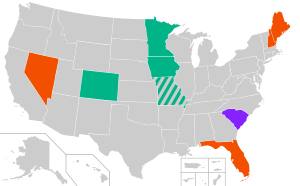The fate of the world is in their hands. It may sound a bit
melodramatic, but it’s true, whoever the Republicans decide to put forward will
affect who becomes president even if it’s Obama. Let me explain, many Americans
are swing voters, which means they are on the Republican/Democrat borderline.
So if the Republicans select the more moderate Mitt Romney then they will
probably take more of the swing voters, making a Republican president more
likely. On the other hand if they select the more hardline Rick Santorum then
they will be less able to attract swing voters and this will lower the chance
of a Republican president.
So far nine primaries/caucuses have been held
(although the Missouri Primary didn’t award delegates, they will award
delegates after a caucus in March) Romney has won four, Nevada, Florida, Maine
and New Hampshire. He is currently tied with Rick Santorum who has also taken
Iowa, Minnesota, Missouri and Colorado. Gringrich is currently third having
only taken South Carolina and Ron Paul is trailing behind with no states. Yet
the system is more complex than simply how many states won, due to variations
in population different states award different numbers of delegates, some
states award all delegates to the winner and some states award delegates to the
runners up. In terms of the popular vote Mitt Romney is well ahead with over 1.1
million votes, Gringrich is second on 840,000 votes, Santorum is third on
432,000 votes and Ron Paul is still last on 310,000 votes. Yet more important
than the amount of states carried or even the popular vote is how many
delegates each candidate have received and this changes the order again. Romney
is still first on 91 delegates, Gringrich is second on 32 delegates, Ron Paul
third on nine delegates and Santorum is last on only four delegates. The reason
for Santorum’s poor placing in terms of delegate numbers is that the four
states he won are all non-binding, despite this he has still proved extremely
strong.
 |
| The front runner Mitt Romney |
 |
| Rick Santorum |
The system by which Republicans select their presidential
candidate is far from simple. Rather than simply a national vote of all
Republicans in which the person who gets the most votes wins the nomination
there is a complicated patchwork of state primaries or caucuses, binding or
non-binding, winner takes all delegates or runners up get delegates too. The
reason why Santorum has very few delegates is because the four states he won
were all non-binding and delegates do not have to pledge to a candidate. The
first state to go to the polls was Iowa, the state has the largest caucus of
the race and is key, people who do well in this state tend to go on to become
the Republican candidate, Santorum won this state but by an extremely slim
margin. The second state to go to the polls was New Hampshire, which holds the
country’s first primary. Here Romney did very well and won the state easily.
The third state to go to the poll was South Carolina, here Newt Gringrich was
chosen. This has been the first time since 1980 that three different candidates
have been chosen for the first three states. It shows that the Republicans are
extremely divided on who should become their presidential candidate. This
leaves the race wide open, usually after South Carolina has voted the winner
has been effectively chosen. This means that the early states have much more
importance than the last states, resulting in more power being focused on the
first few states. After South Carolina only four of the original seven
candidates were left, after polling poorly in Iowa, Michelle Bachmann dropped
out, Jon Huntsman left after placing third in New Hampshire, a state he had
invested heavily in propaganda. The final person to drop out was Rick Perry who
dropped out two days before the South Carolina polling and endorsed Gringrich.
 |
| Newt Gringrich |
 |
| Ron Paul, trailing behind |
The Republican presidential race is viewed by many,
including myself, as a three horse race, Gringrich has only won one state and
Paul has won none, whereas the frontrunners, Santorum and Romney are tied on
four each but in the delegate and popular vote count put Gringrich and Romney
as the front runners. Romney is probably going to get the nomination as he is
first or joint first by any measure and most Republicans realise he has the
best chance of defeating Obama. If the results of the Super Tuesday, in which
ten states go to the polls, are decisive, then the race will largely be a
foregone conclusion. If they are more mixed then it could be the closest race
in years. Between Santorum and Romney, if I had to choose one to be President I would definitely choose
Romney as he is more moderate. On the other hand I would rather Santorum wins
the race as I believe he is too hardline for many of the swing voters, making
Obama more likely to be re-elected. From my experience most Europeans would
support a Democrat over a Republican; polls show that when America elects a
Democrat as president it is more popular internationally than when it elects a
Republican. This is most acute in Europe which is much more liberal than
America. It’s not only public opinion outside of America that wants Obama re-elected,
the IMF in a recent statement said that for America to continue its current
growth rate it must keep the stimulus. As the Republicans have pledged to stop
the stimulus the IMF may as well have said, don’t vote Republican.
With the race so tight it’s impossible to know what will
happen. Michigan and Arizona are the next states to go to the polls when they
both hold primaries on the 28th of February.
 |
Romney in Orange, Santorum in Green and Gringrich in Purple
source: wikipedia.org |
























.jpg)